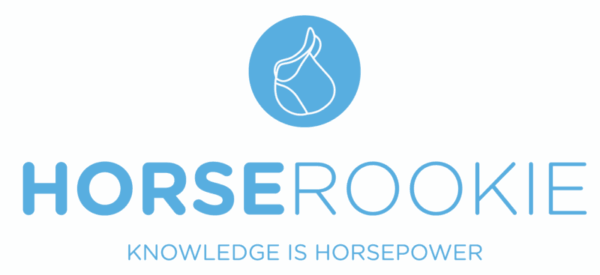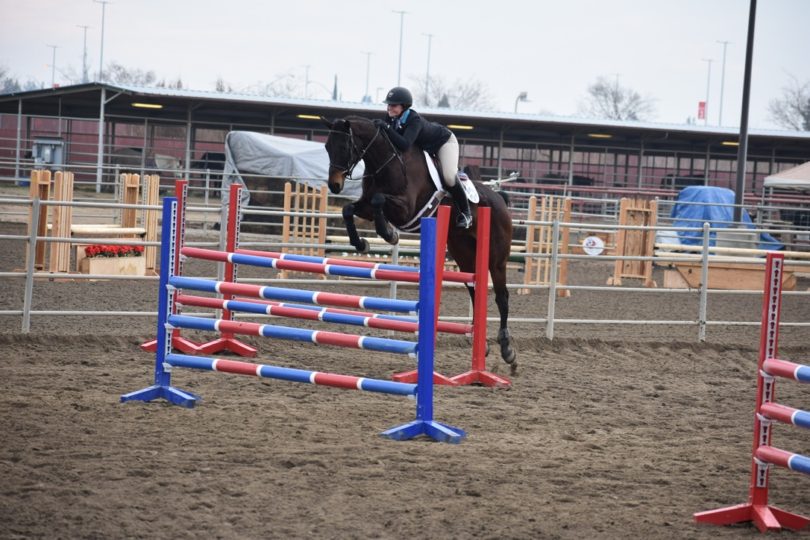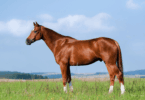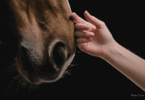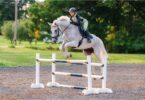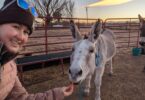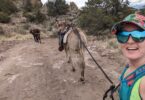College Team: Delaware State University (Learn More)
State: New Mexico
Year in College: Junior
Joined Team: 2016
Riding Discipline(s): Hunt Seat
About Eva: I am a Junior PreVet major from Albuquerque, New Mexico. When I’m not riding, I’m either studying or spending time in the gym. Currently, I am a hunt seat captain of our team. Along with riding horses, I am also an amateur boxer. I plan to begin applying to veterinary schools this summer.
Collegiate Equestrian Interview
Q: What was your pre-college horse experience?
Prior to college, my riding experience included showing on the AA/A USHJA Circuit in New Mexico, Colorado, California, and Texas. I first sat on a horse when I was five, and I’ve been hooked ever since!
As a junior, I compete in the equitation and jumper divisions.
Q: What were equestrian team tryouts like?
I was recruited for our Division I equestrian team, so there were no tryouts for me. Coaches actively recruit riders and provide questionnaires that athletes complete.
Along with these questionnaires, athletes have the opportunity to submit personal portfolios that can include information about their riding and academic accomplishments, along with videos of them showing, lessoning, and riding different horses.
From my personal experience, coaches use videos the most during the recruiting process. It’s really important to show your capabilities on many different horses, in or out of the show ring, and to provide the best footage possible.
Coaches also keep a close eye on the academic accolades of the recruits, because academics are the foundation of every college program. High GPA’s and academic accolades speak volumes during the recruitment process.
When coaches are sifting through all of their new recruit information, you want yours to stand out! Whether it may be riding or academic accomplishments, highlight what you can uniquely offer to the program.
Q: Describe a typical week on the team.
A typical week on the team consists of three one-hour long ride times, two team workouts, and any volunteer or bonding activities the team is participating in.
I am currently a hunt seat captain, which can sometimes make my schedule a little busier than others with additional meetings and responsibilities I’m in charge of. About twice per month, every team member is responsible for doing barn chores at a local barn as a type of fundraiser for our team.
On the social side of things, many of the girls on our team are very close, and we spend any free time hanging out with each other. Overall, the team doesn’t entirely consume our schedules. Some weeks are busier than others, but we always have time to ourselves, as well.
Q: What type of riding did you choose and why?
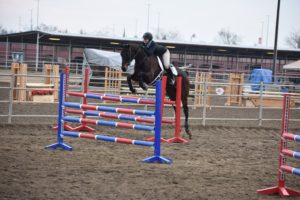 I ride on the hunt seat team and show in both flat and fences. The first barn I ever rode at was a hunter/jumper barn, and I haven’t strayed from the discipline since.
I ride on the hunt seat team and show in both flat and fences. The first barn I ever rode at was a hunter/jumper barn, and I haven’t strayed from the discipline since.
Growing up all I ever wanted to do was jump horses, so I have been fortunate to be able to stick with it for so long.
I love this discipline for many reasons, but I am especially fond of jumpers. My favorite thing has always been jumping, and I hope to continue showing in jumpers long after college.
Q: What are some challenges of balancing academic and equestrian responsibilities?
Sometimes it becomes difficult to balance academics and riding. But, as a student athlete, I have many resources available when I need a little extra help. The most challenging times come when are traveling to competitions and have to miss classes.
Fortunately, any classes that we miss when we are competing are excused. Making up missed work, however, can be difficult.
If I ever start falling behind, we have athletic advisors and tutoring centers to advise us on studying habits and help interface with professors who may be picky about students missing classes.
If there is ever a time when I am really stressed about an exam or need to go see a tutor and it interferes with team activities, our coaches are very understanding. They want us to be as academically successful as possible.
Having such a strong support system has helped me balance the team and school very successfully!
Q: What’s one “rookie mistake” you made?
A “rookie mistake” that I made was setting up a Pelham bit incorrectly. It was actually this year, and as a captain that is definitely one of the most embarrassing things that could have happened to me!
I was rushing to get on for a ride time and had to put together a bridle really quickly. Unfortunately, I was rushing so much that I didn’t even realize my mistake until it was too late.
My best advice is to always allow yourself extra time when you’re at the barn. Sometimes things come up that need to be handled immediately, and I am always grateful to have a few extra buffer minutes. And if something doesn’t come up, I can always take care of something else, like the laundry, or be leisurely with my time when I’m tacking up or untacking.
Q: What have horses taught you?
Horses have taught me so many priceless lessons that I am so grateful for. Riding and owning horses for such a long time has taught me how to be dedicated, responsible, hard-working, and humble.
As a junior rider, the horses I rode and showed weren’t “fancy.” But, this taught me that if you want to win, even when the odds are against you, working hard is non-negotiable.
Trying to show horses beyond the caliber of my own made me gritty and more determined to fight to the top. Being dedicated to my goals and constantly trying to progress, I learned about responsibility and accountability.
To improve I had to be at the barn everyday, learning and getting as much experience and exposure as possible. And, when my hard work did pay off, it was incredibly humbling to look back on what it took to get there. From the tough and discouraging rides to actually achieving your goals, that’s an incredible mix of pride and humility.
One more important lesson that horses have taught me is how to have fun. Although it is important to work hard and remain dedicated, it’s also (more than) okay to have fun!
It’s okay to not always be so serious. Being able to have fun and enjoy horses makes it easier for the times that you do have to crack down and get to work.
Q: If you could travel back in time to your first day on the team and give yourself one piece of advice, what would it be?
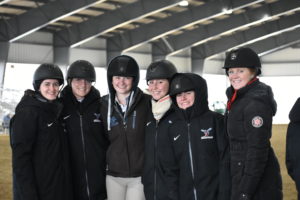 If I could travel back to my first day on the team, my advice would be to not take everything so seriously and to always have fun with what I do.
If I could travel back to my first day on the team, my advice would be to not take everything so seriously and to always have fun with what I do.
Freshman year can be difficult on any type of team, and in busy, stressful times it can become overwhelming to balance the team, academics, and life in general.
The biggest lesson I learned–or relearned, actually–was why I loved riding and competing. It is incredibly important to always remember your purpose.
No matter how badly you mess up a jump course or how poorly you perform on a quiz, it’s important to remember to always have fun and to shake off whatever has gone badly.
No matter what, you can’t stay stuck in a place of disappointment, anger, or frustration.
Remembering why you love to ride, compete, and work with horses keeps that from happening and helps you continually move forward and grow.
Q: Why should students join a college equestrian team?
If you have the opportunity to join a collegiate equestrian team, they should absolutely take it because it gives so much more than it takes.
No matter how much time or energy it takes, it’s so worth it. The transition from high school to college can sometimes be difficult, but staying busy with the team and dedicated to your riding, along with school, can help ease any homesickness and unfamiliarity that comes along with moving away from home.
The team gives you a family away from home, and that is priceless.
Along with an opportunity to find your niche, a collegiate sport looks great on any resume. Many teams create connections for their athletes, and it gives you an edge after college.
Collegiate sports are known for manufacturing people who are driven, hard working, responsible, and dedicated adults who are ready for the real world.
Having to work alongside fellow peers in a competitive environment well prepares students for many scenarios they will experience after college. All of these reasons, make collegiate riding so incredibly important and unique.
[youtube https://www.youtube.com/watch?v=glKQyGceqEI]Q: What’s one piece of gear you can’t live without?
If I had to choose something I can’t live without, it would be a tie between my spurs and gloves. I think spurs are incredibly important tools, and I rely on them so much that if there is ever a time that I don’t have to use them, I almost feel naked.
You never know the horse that you will be riding in competition, and you usually don’t have the time to completely figure them out before going into the ring. My spurs help me effectively do my job by enhancing my leg aids, especially when I need that little extra push on horse that I’m not familiar with.
On the other hand (pun intended), my gloves are critical. I think a good pair of gloves are essential for every rider because they protect your hands and are a stylish accessory!
One of my least favorite things to do is ride a heavy horse and having my fingers and hands blister or callus. With the right pair of gloves, that will never happen! My personal favorites are the black Roeckl gloves with navy trim.
Q: Who is your favorite horse to ride and why?
My favorite horse to ride is King. He is an awesome, seasoned show horse who came to our program last semester. He’s a gentle giant at 17.3hh, and he has the sweetest face and kindest eyes. I love riding him because he feels like a giant couch and has the best personality!
About the Team Shop Horse Rookie Riding Essentials Meet More StudentsEnjoy this article? Trot on over to:
- Horseback Riding in College: Tips from Shelbe Jarrett
- Horseback Riding in College: Tips from Alexi Neilsen
- 10 Best Stirrups for Jumping Clear (and Staying Safe)
- Shelby Dennis: Best Horse Riding Advice & Rookie Mistakes
- Horseback Riding: What to Wear (With Pictures)
- Equestrian Media Guide (Vlogs & Podcasts)
